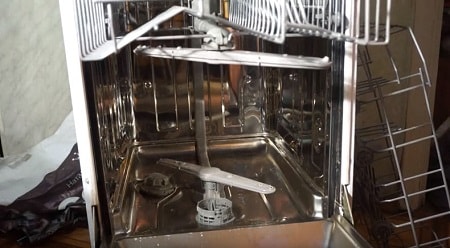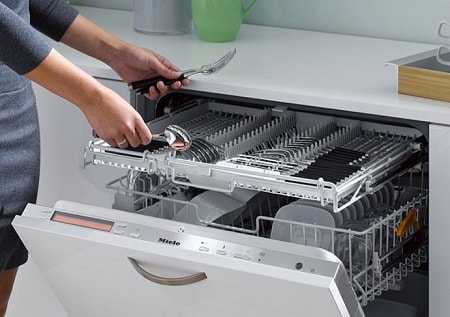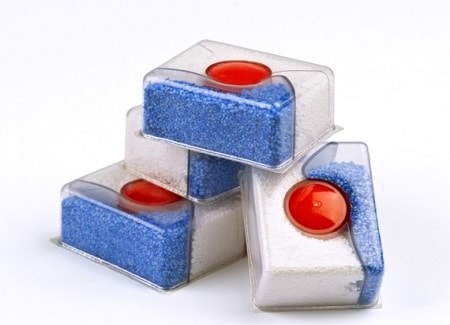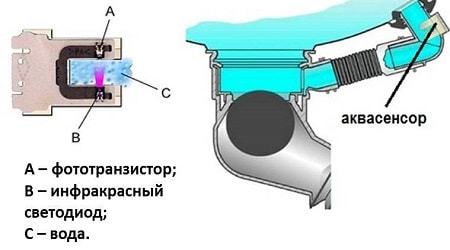There are hardly many people who love to wash dishes. Many housewives have long felt from their own experience how important it is to have a dishwasher in the house. This wonderful assistant is able to do wonderful things: save you from standing for many hours at the sink and please you with clean dishes washed to a shine. High-quality dishwasher models can work reliably for many years. But sometimes, after a while, the hostesses begin to notice that the dishwasher does not wash the dishes well, that stains, grease stains, plaque or even food debris are visible on it.
Why does such an incident happen? What to do? How can you help your beloved assistant, eliminate a malfunction and improve the quality of washing?
Reasons for poor dishwasher performance
Of course, the quality of washing cups and plates in a dishwasher depends on many factors. But all of them can be roughly divided into four main groups:
- improper operation;
- blockage or scale formation;
- the use of low-quality detergents or dosing errors;
- dishwasher malfunction.
Let's take a closer look at these reasons and think about how to eliminate their consequences.

Read instructions
If your dishwasher does not wash dishes well, then first pay attention to how you operate the unit. Typical mistakes that housewives make when using can be such as:
- exceeding the volume of loaded dishes, in other words, there is too much of it;
- violation of the operating mode - the program is incorrectly set;
- the dishes are not properly placed in the rack.
Before putting dirty cups and plates in the basket, you should at least once look in the instructions on how to do it correctly. This is especially true for models from the Electrolux or Bosch brands. The location of the dishes should be such that they do not interfere with the rotation of the spray arm and do not block access to where the detergent is located. You also need to ensure that the utensils located below do not block the access of water to those items that are above.

Now the next step. As you can imagine, the more dishes are loaded into the dishwasher, the less water and powder is per unit volume. If you load the car too tightly, the water and powder will simply have nowhere to turn around - you will have to wash everything again.
The next mistake is choosing an operating mode that does not correspond to the type of contamination. If you put a greasy frying pan in the dishwasher and turn on the glass mode, the frying pan will remain dirty, because it needs to be washed differently. In the "quick wash" operating mode, which assumes a water temperature of about 45˚, you simply cannot rinse the grease from pots and plates. All options and types of downloads, as well as operating modes suitable for them are also described in detail in the instructions.
![]() See also - Dishwasher water does not leave: causes of malfunction
See also - Dishwasher water does not leave: causes of malfunction
Dishwasher breakage and blockages
If stains on the dishes after the dishwasher have become a constant occurrence, then most likely you need to clean them. Yes, yes, like any other household appliances, the dishwasher can get dirty and from this work worse. In any washing unit, regardless of type and model, there are several places worth visiting regularly:
- mesh filter for food residues;
- bulk filter;
- sprinklers;
- Heating element and tank.
Advice:
First of all, follow the instructions for use and find a filter in your dishwasher to catch food particles. If the dishwasher does not wash well, it is most likely dirty. Usually the filter is located at the bottom of the unit and is a fine mesh. It should be cleaned and washed at least once every 10 days.
If in your apartment not too pure and soft water flows from the pipes, then be sure to regularly change the core of the coarse filter, which is located at the entrance to the dishwasher. If this filter is clogged, the water pressure entering the unit will be significantly weakened. Weak water pressure is another reason why the machine does not wash dishes well and deposits remain on it.
The nozzles, heating elements and the tank of your assistant may suffer from the presence of limescale, in other words, scale. To prevent this from happening, purchase a descaler for your type of dishwasher. Run it in idle mode at least once a month. Use a product that dissolves and removes limescale.
Important:
To prevent the inside of the dishwasher from rusting and becoming an additional source of problems, wipe the inside with a dry soft cloth after completion of work.
Use of substandard detergents
If you notice that the dishwasher does not wash the dishes well, take a closer look - the reason may lie in the use of low-quality powder or other detergent. If you recently changed your detergent and began to notice plaque and stains on mugs and plates, do not hesitate, this is precisely the reason. Fixing the problem is easy - buy the right product and your dishwasher will clean better.
If you are using the same product as before, and the machine has begun to wash the dishes worse, then perhaps the matter is different:
- a gray coating is visible on seemingly clean dishes and stains have appeared - there is clearly not enough rinse aid in the water, you need to adjust its consumption;
- the machine washes traces of tea, coffee and lipstick poorly - the detergent contains little bleach; to improve the result, purchase the appropriate additives or change the detergent;
- for some reason, white streaks remain on the pots - the salt lid is not closed tightly; the salt powder gets inside the machine and a white coating is obtained;
- plastic dishes remain greasy - there is not enough fat-dissolving substance; change detergent or add additives manually.

Important:
The dishwasher may malfunction if a product is used for another purpose. It may seem to you that everything remains the same, but over time, the performance of the unit will begin to deteriorate, and soon it will stop washing dishes altogether.
If your dishwasher starts to leave greasy stains and streaks on the dishes, remember the last time you used special salt. The reason may lie in the fact that, due to excessively hard water, the ion exchanger failed and the detergents began to dissolve poorly in the liquid. Reapply salt and the dishwasher will work better over time.
Obvious dishwasher breakdowns
If the elimination of all of the above causes did not bring the desired result, the problem can be really serious. Perhaps the reason for the poor performance of the dishwasher is a malfunction. (See also: How to repair a dishwasher with your own hands? )
Electric heater (TEN) burned out
Since this element is in constant contact with water, it is very susceptible to limescale buildup. With long-term operation of such a "coked" heating element, it simply burns out. If this happens, then the water in the dishwasher simply does not heat up, and it is not possible to wash off grease and dirt with cold water.
Sprayer impeller does not work
Each machine has a special mechanism that, when rotating, sprays water in different directions. This is done so that the streams of water can get into the most inaccessible places. If this mechanism does not work, water does not reach everywhere and the dishes remain unwashed.
Broken water turbidity sensor
Such a device is mainly found only in new models of dishwashers. The sensor transmits data on the quality of the water to the control module: if it is cloudy, the washing must be continued, if it is clean, the process is completed. When the appliance is faulty, the "brain" of the machine is left without information and the dishwasher does not understand how to complete the cycle correctly.

Broken recirculation pump
This device is responsible for supplying water. If it breaks down, the unit will not work at all, since water does not enter it.
Thermostat burned out (temperature sensor)
This node in the dishwasher measures the temperature of the water and feeds the data to the program control module. Depending on the received data, the "brain" gives the command to the heating element to heat the water. If there is no signal, the water will remain cold and the dishes will be dirty.
Error in the operation of the control module
This is the most serious breakdown. Simply put, your home helper went blind and deaf at the same time. This part of the unit controls all processes: it gives commands about filling and draining of water, supply of detergent, degree of spraying, and so on. If the control module is knocked down or broken, the dishwasher will certainly work poorly or stop altogether.
All these malfunctions are very serious. To eliminate them, you will most likely have to invite a technician or contact a repair shop.
![]() See also - Which brand is the best dishwasher
See also - Which brand is the best dishwasher

